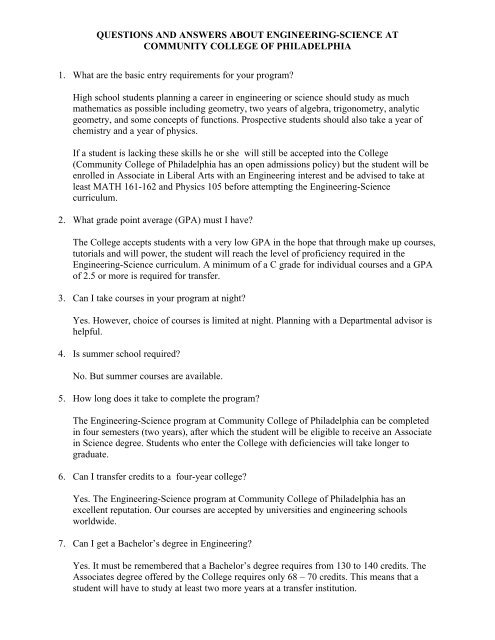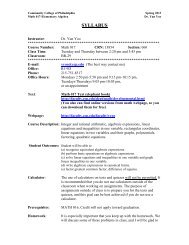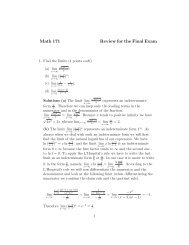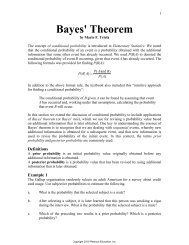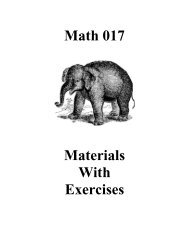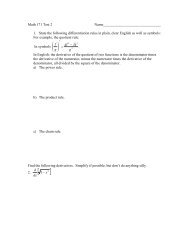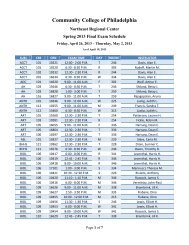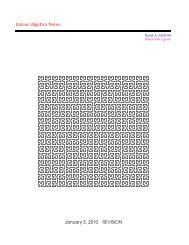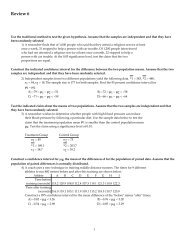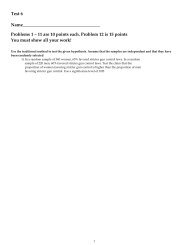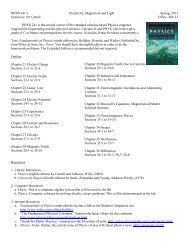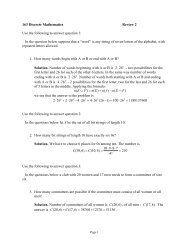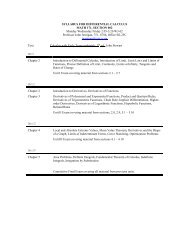QUESTIONS AND ANSWERS ABOUT ENGINEERING-SCIENCE AT ...
QUESTIONS AND ANSWERS ABOUT ENGINEERING-SCIENCE AT ...
QUESTIONS AND ANSWERS ABOUT ENGINEERING-SCIENCE AT ...
You also want an ePaper? Increase the reach of your titles
YUMPU automatically turns print PDFs into web optimized ePapers that Google loves.
<strong>QUESTIONS</strong> <strong>AND</strong> <strong>ANSWERS</strong> <strong>ABOUT</strong> <strong>ENGINEERING</strong>-<strong>SCIENCE</strong> <strong>AT</strong><br />
COMMUNITY COLLEGE OF PHILADELPHIA<br />
1. What are the basic entry requirements for your program?<br />
High school students planning a career in engineering or science should study as much<br />
mathematics as possible including geometry, two years of algebra, trigonometry, analytic<br />
geometry, and some concepts of functions. Prospective students should also take a year of<br />
chemistry and a year of physics.<br />
If a student is lacking these skills he or she will still be accepted into the College<br />
(Community College of Philadelphia has an open admissions policy) but the student will be<br />
enrolled in Associate in Liberal Arts with an Engineering interest and be advised to take at<br />
least M<strong>AT</strong>H 161-162 and Physics 105 before attempting the Engineering-Science<br />
curriculum.<br />
2. What grade point average (GPA) must I have?<br />
The College accepts students with a very low GPA in the hope that through make up courses,<br />
tutorials and will power, the student will reach the level of proficiency required in the<br />
Engineering-Science curriculum. A minimum of a C grade for individual courses and a GPA<br />
of 2.5 or more is required for transfer.<br />
3. Can I take courses in your program at night?<br />
Yes. However, choice of courses is limited at night. Planning with a Departmental advisor is<br />
helpful.<br />
4. Is summer school required?<br />
No. But summer courses are available.<br />
5. How long does it take to complete the program?<br />
The Engineering-Science program at Community College of Philadelphia can be completed<br />
in four semesters (two years), after which the student will be eligible to receive an Associate<br />
in Science degree. Students who enter the College with deficiencies will take longer to<br />
graduate.<br />
6. Can I transfer credits to a four-year college?<br />
Yes. The Engineering-Science program at Community College of Philadelphia has an<br />
excellent reputation. Our courses are accepted by universities and engineering schools<br />
worldwide.<br />
7. Can I get a Bachelor’s degree in Engineering?<br />
Yes. It must be remembered that a Bachelor’s degree requires from 130 to 140 credits. The<br />
Associates degree offered by the College requires only 68 – 70 credits. This means that a<br />
student will have to study at least two more years at a transfer institution.
<strong>QUESTIONS</strong> <strong>AND</strong> <strong>ANSWERS</strong> <strong>ABOUT</strong> <strong>ENGINEERING</strong>-<strong>SCIENCE</strong> <strong>AT</strong><br />
COMMUNITY COLLEGE OF PHILADELPHIA<br />
8a. What kinds of jobs can I apply for after receiving an engineering degree?<br />
Most of our students go to get degrees in Electrical or Mechanical Engineering. The field of<br />
engineering is as varied and interrelated as our industries. The following is a partial list given<br />
in alphabetical order: Aeronautics, Aerospace, Architecture, Biomedical, Chemical, Civil,<br />
Computer, Defense Systems, Electrical, Electronic, Environmental, Energy, Mechanical,<br />
Nuclear.<br />
8b. What are the entry level salaries for jobs in engineering?<br />
$50,000 - $60,000. See www.salary.com for currently available jobs, job descriptions and<br />
salaries.<br />
9. What are the advantages of taking the first two years of a four-year program at Community<br />
College of Philadelphia?<br />
The advantages are many:<br />
1. Teaching is our only vocation and we try hard: small classes, instructors are accessible,<br />
excellent support services, counseling, free tutoring and mentoring.<br />
2. Financial advantage: cost to a resident of Philadelphia is less than $3500 a year, which is<br />
$5,000 to $15,000 less than what some schools charge for the same education, an obvious<br />
advantage for a paying student. For a student receiving a loan that means $10,000 to<br />
$30,000 less to repay. By saving that money a student may be able to afford graduate<br />
school.<br />
10. What kind of job can a student get if he/she stops after the two year Associate degree?<br />
Most students who take the Engineering-Science curriculum are interested in transfer to a<br />
four year university or college. However, there are students who take our curriculum to:<br />
discover field of work in which they might be interested; improve knowledge and skills for<br />
the currently held job or improve chances for a raise or promotion and at the same time to<br />
keep an open option for the future transfer to a four year college.<br />
Some of our alumni who chose not to transfer immediately to another college reported to<br />
work as: Chief production engineer, Process engineer, Assistant project engineer, Systems<br />
planning and electrical engineer, Electronics technician, Civil engineer technician, Supply<br />
technician, Maintenance engineer, Financial officer, Correctional officer.<br />
Their salaries vary from $11,000 to $40,000 a year.<br />
11. I have applied to the College but have not heard from the Admissions Office. Who do I call?<br />
Community College of Philadelphia is a big school, one of the largest institutions of higher<br />
education in the city. Although we do have an open admissions policy, processing and<br />
placement takes time. If you are interested in engineering, you may call the Physics<br />
Department office at 215 751-8417. The Department Chair can assist you with registration.
12. What is the difference between engineering science and engineering technology?<br />
THE <strong>ENGINEERING</strong> TEAM<br />
The following information is intended to help prospective students interested in engineering related careers to better understand the wide categories<br />
of activities and the relationship of educational requirements, job duties and responsibilities of each member of the engineering team.<br />
<strong>ENGINEERING</strong> is the art of looking at problems and finding solutions.<br />
<strong>ENGINEERING</strong> TECHNOLOGY is the application and implementation of established engineering and scientific concepts.<br />
CHARACTERISTICS ENGINEER <strong>ENGINEERING</strong> TECHNOLOGIST <strong>ENGINEERING</strong> TECHNICIAN<br />
N<strong>AT</strong>URE<br />
OF<br />
WORK<br />
Translates findings of science into<br />
useable form with designs. Develops<br />
new procedures, methods and devices<br />
useful to man. Innovates.<br />
Specialist in translating conceptual ideas<br />
and scientific concepts into functional<br />
systems. Implements.<br />
Assists design engineers and technologists.<br />
Performs specific tasks under direct<br />
supervision which involves repetitive or<br />
manipulative skills. One who does.<br />
SKILLS<br />
INVOLVED<br />
Primarily utilizes theoretical and<br />
abstract concepts and skills (90%<br />
theoretical – 10% manual).<br />
Less theoretical and mathematical but<br />
more practice-oriented (70% theoretical<br />
– 30% manual).<br />
Predominantly manual skills utilized. (30%<br />
theoretical – 70% manual).<br />
LEVELS<br />
OF<br />
EDUC<strong>AT</strong>ION<br />
B.S. degree in Engineering: 4 years –<br />
approximately 137 s.h. at a university.<br />
Master’s in Engineering: 5 years.<br />
Doctor’s degree.<br />
B.S. degree in Engineering Technology:<br />
4 years – approximately 124 s.h. at a<br />
college of technology or university.<br />
Master’s in Technology.<br />
Associate in Technology/Science: 2 years –<br />
approximately 60-68 s.h. at a technical<br />
institute or community college.<br />
CURRICULUM<br />
Highly mathematical and scientific in<br />
content. Emphasis primarily on theory<br />
with little laboratory experience.<br />
Utilizes higher mathematics and<br />
scientific concepts to a lesser degree.<br />
More specialized with emphasis on<br />
laboratory experiences.<br />
Technical mathematics and concepts with<br />
great emphasis on laboratory procedures<br />
and experiences. Limited theoretical<br />
content.<br />
AREAS<br />
OF<br />
RESPONSIBILITY<br />
Research, development, project<br />
planning, designing, facilities operation<br />
and maintenance, regulation and<br />
enforcement, teaching, construction<br />
management, equipment selection and<br />
specifications.<br />
Production, manufacturing production<br />
control, quality control and assurance,<br />
sub-system and detail designing.<br />
Fabrication, surveying, inspection, field<br />
service representative.<br />
Testing, measuring, repairing, maintenance,<br />
servicing, model building, preparation of<br />
drawings and detail plans. Computing and<br />
plotting data.


